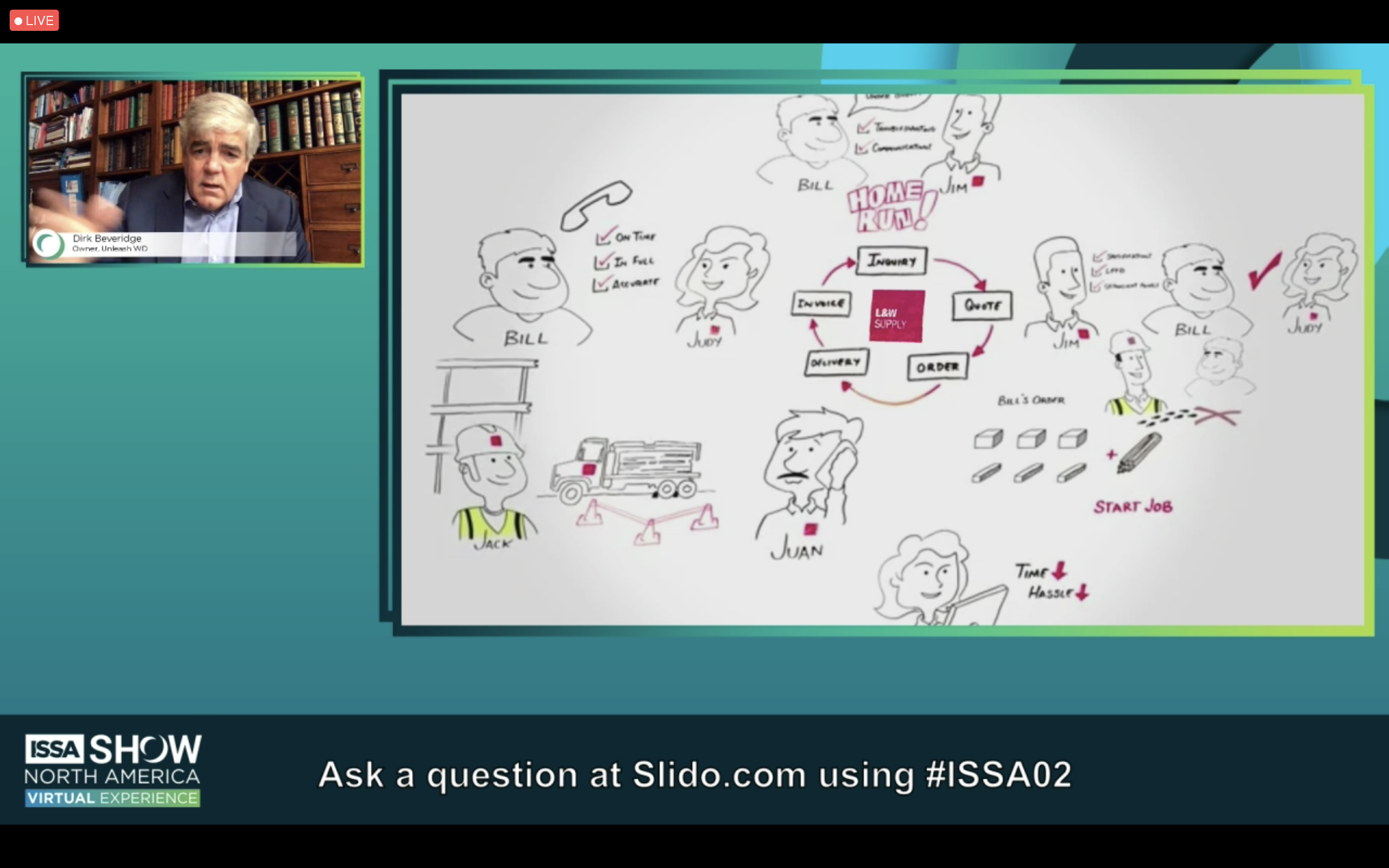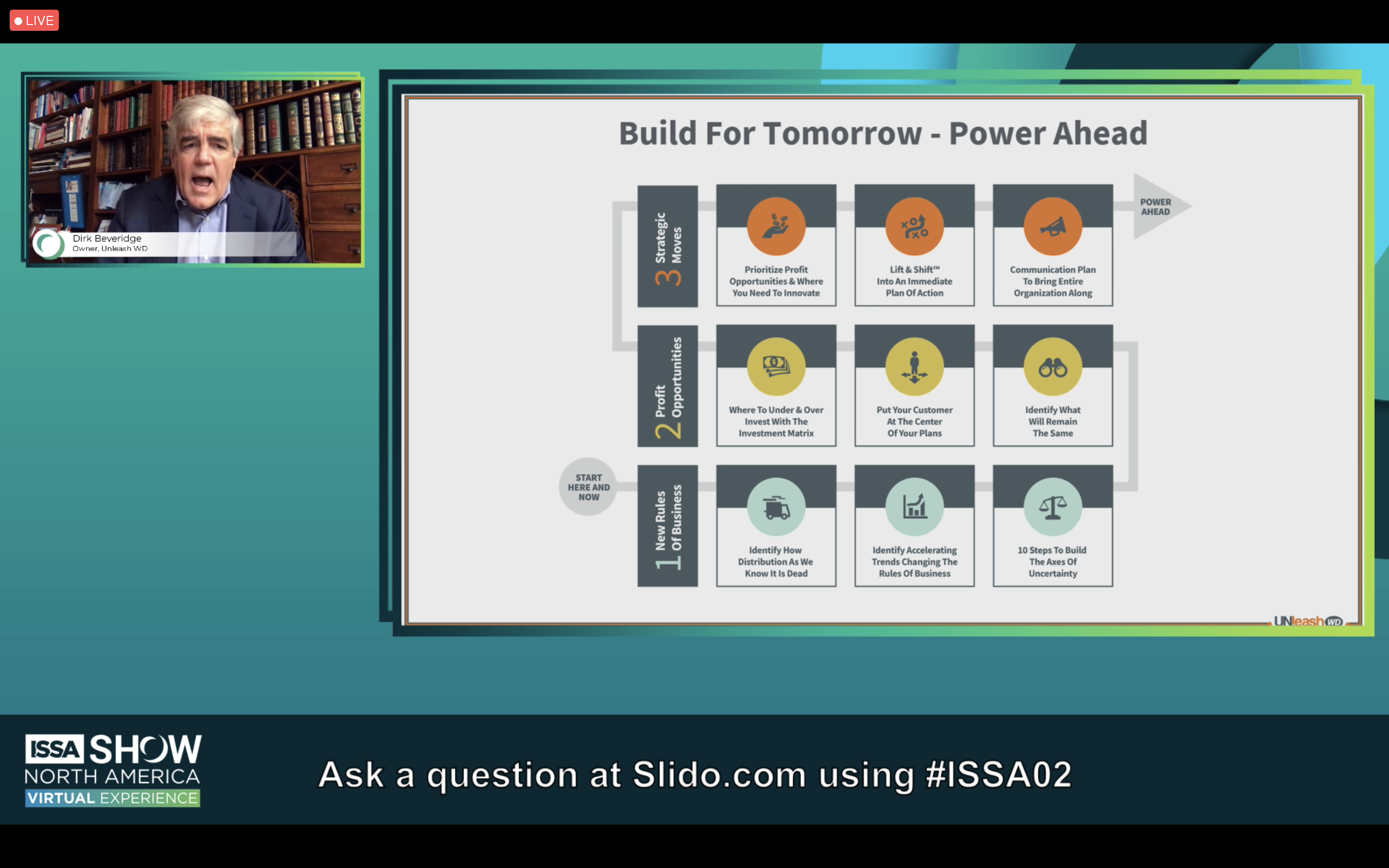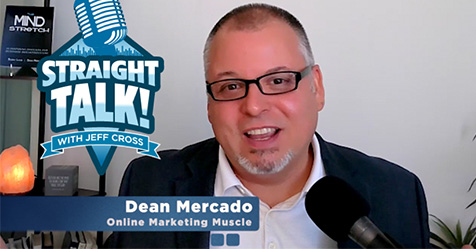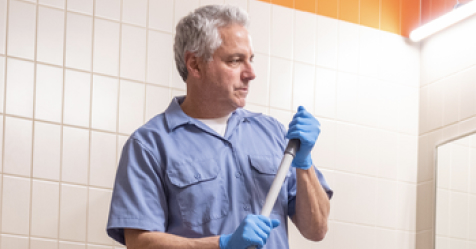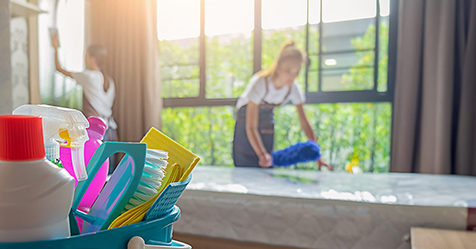Virtual Experience Wraps Up With Final Education Sessions and an Innovative Winner
First ISSA Show Virtual Experience ends in an 80s rockin' groove
The last day of ISSA Show North America Virtual Experience started like the others, with a variety of educational sessions appealing to cleaners, facility managers, and others in the cleaning industry. But it ended with a bang with a closing ceremony and an announcement of the winner of the Innovation Award Program—TASKI® IntelliSpray for swingo® by Diversey
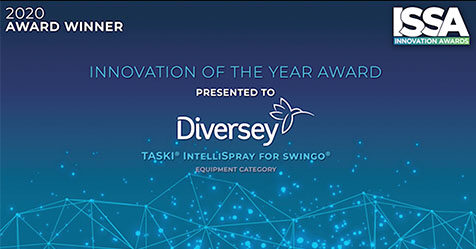
Runners up were:
- Dispensers: HyTech Ocean by Sofidel Group
- Cleaning Agents: Botanical Disinfectants (Kitchen, Bathroom and Wipes) by Seventh Generation Professional, a Unilever Brand
The show closed with a live, online performance by an 80s cover band, Electric Avenue.
Give Modern Customers What They Want
To start off his educational session, Understanding the 21st Century Customer, Ron Segura, president of Ron Segura Associates, took attendees down memory lane on how shopping used to be.
“One of the most traumatic procedures for me is purchasing a vehicle,” he said, explaining how he would prepare his buying strategy and make a plan for how much he wanted to spend. “When your foot takes that first step onto dealership property, your strategy dissolves.”
Segura then went on to explain how he’d spend three to four hours in the dealership as salespeople took him into a little room to discuss price, then they repeatedly left the room to talk to their manager, allegedly to get him the best deal. “It’s so traumatic, we’ve all been there,” he said.
Today, the first step most consumers take is researching a product or service on the internet. That’s true whether they’re shopping for a new vehicle or for a new cleaning service. To attract 21st century customers, service providers must have websites that detail not just the features of their company, but also the benefits of doing business with their company.
For instance, it’s not enough to just say your company uses the latest technologies in vacuums. “You want to say we use the latest vacuum technology that results in a dust-free environment to protect the health of building inhabitants,” Segura said. It’s not enough to say you have a green company. “You need to focus on the tremendous impact your green cleaning has made on the environment, on sustainability, and how your practices are resulting in zero waste,” he said.
Cleaning providers are in high demand today, especially with the coronavirus pandemic setting new standards for cleanliness. Ensure you are communicating effectively with potential clients so they know you have something they need. Begin by following up quickly with customers seeking your services.
“What happens when you text someone and they don’t respond in the next 10 to 15 minutes?“ Segular asked. “We’re in an age where people want an instant response. You can’t get back to people at the end of the workday like we used to.”
Don’t offer clients any services you can’t deliver. “Stick to what you promise,” Segura said. “In the heat of the battle we may throw other things on the table to get a client’s business, hoping they will forget, but 21st century customers will hold you to your promises.”
Keep up-to-date on the latest cleaning technologies and expect customers to ask questions. “Modern customers want cleaning contractors that can instruct them,” Segura said.
Segura ended the session citing ISSA’s virtual meeting as an example of how cleaning professionals need to adapt to the situation to attract new clients.
“Who thought we’d be meeting on the internet,” he said. “That’s the type of vendor the 21st century customers is looking for, someone who can adapt quickly but still provide quality work.”
College and University Facility Managers Navigate COVID-19
COVID-19 has presented college and university facility directors with many new challenges including how to navigate new COVID-19 protocols and requirements, support their teams of frontline workers, protect the health and safety of their students and staff on a tightening budget, and much more.
In Thursday’s midday session Leadership Challenges Facing Colleges and Universities During COVID-19, Virtual Experience attendees heard how three award-winning college and university facility directors, who are members of the Healthy Green Schools & Colleges Steering Committee, have addressed these challenges at their institutions.
Sarah Porter, director of Health Green Schools and Colleges, hosted the panel that included Christopher Raines, director of Administrative Services at Cosumnes River College in California, Gene Woodard, director of the Building Services Department at University of Washington, and Kimberly Thomas, senior director of Services, Facilities Management Division at University of Georgia.
Raines’ college faced a hard shut down in March and his staff was sent home right away. With a spring reopening now in sight, he has worked to develop and oversee reentry plans for all departments that are consistent and that can be easily accessed at all times. He stressed having a consistent format for all reentry plans across campus. “Model it on an SDS so you can find information quickly and easily,” Raines advised.
While his already robust green cleaning protocols didn’t need to be changed much to meet pandemic cleaning needs, he said the need for communication of those plans has changed and he’ll work to promote a new message of “cleaning for health,” not just appearance, to his staff and the campus going forward.
The University of Georgia in Athens developed a 186-page, three-phase reopening plan that spans all departments. Thomas said facility services leaders took the pandemic as an opportunity to reshape their mission statement, which now states, “Safety is priority of service.”
All supervisors at her school took mandatory online COVID-19 training and leaders were able to easily adapt their green cleaning protocol into the COVID-19 protocol, which became a model for the state. Thomas said her department worked with everyone from students affairs to transportation to adapt. “We wanted them all to have one accord, so our campus students, faculty, and staff felt very safe in what they had to implement across the campus,” Thomas said.
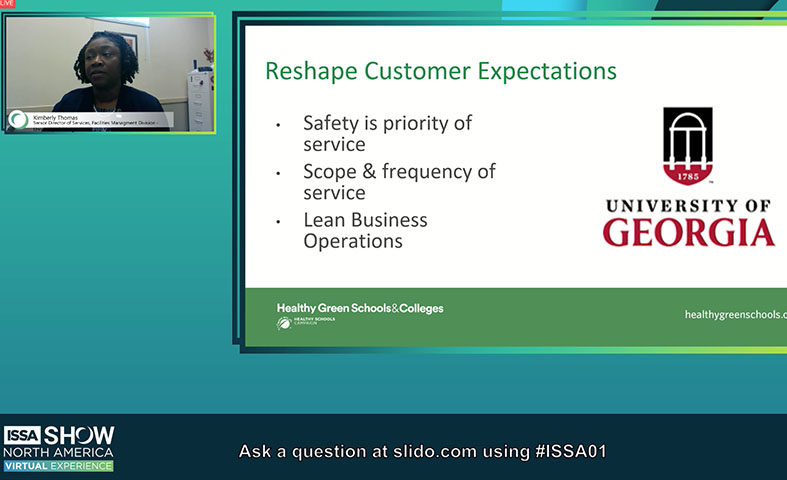
Woodward at the University of Washington in Seattle, an urban campus with 44,000 students and three major research centers, said there were three objectives for his department as the pandemic set in: to flatten the curve (i.e. lower the rising cases of coronavirus), to ensure safety of staff, and to provide meaningful and essential work to support what was still taking place on campus.
In regard to the third objective, Woodward said he developed a five-part cleaning plan for his custodial staff as they began returning to campus in June—even when on-site classes didn’t resume. That plan shifted work to deep cleaning, floor work, and high dusting—projects that custodians normally wouldn’t be able to do with a full campus. Now, they’ve moved on to cleaning microwaves, refrigerators, blinds, upholstery, and carpet.
While training on the new COVID-19 protocols was a must for all departments, Woodward also offered soft skills training to his staff. “We wanted our custodians to have confidence since they are cleaning others’ spaces,” he said. “We wanted them to have the skills and confidence to politely and respectively tell someone to keep their six-foot distance or not enter the bathroom while they were cleaning.”
Here are more best practices these facility directors implemented that others can consider for their own reopening strategies:
- Monitor your building systems (HVAC, water) that have been shut off during the shutdown. As you begin to restart these systems, make sure to have special support crews on site to deal with potential problems, e.g., flooding, that could occur.
- Consider offering voluntary furloughs to staff. For Woodward, this helped his staff who weren’t ready to return to work and also helped his budget since only benefits, not salaries, are provided to furloughed staff.
- Implement third-party vendors to conduct training on COVID-19 prevention, disinfection, and other health and safety topics.
- Evaluate how increased cleaning and disinfection affects the regular academic day and cleaning routines. Thomas said after evaluation they asked for more time between classes to clean and help students feel safe in their environment.
- Get help from grounds workers and maintenance staff to meet added cleaning and disinfection priorities.
- Increase safety and hygiene in your campus transportation fleet. Make sure vehicles are disinfected and the number of passengers is limited. Consider van pool commuting. Woodward worked with local transit agencies to acquire additional vans to meet social distancing requirements and accommodate only two to three people per van.
- Help employees increase their stamina. Remember some employees haven’t worked eight-hour shifts for some time. As they return to work, help them remember how important stretching and good physical fitness is to their jobs.
- Record videos with custodial staff to share with campus faculty and students about what cleaning staff is doing to protect their health and safety.
- Reduce or eliminate graveyard shifts. People want to see cleaning taking place. Move shifts to day-time hours.
- Offer programs that show appreciation to your staff. Woodward said his university developed an emergency fund the campus community could contribute to. Staff in need could apply for grants to help them through tough times.
This session was part of the Healthy Green Schools Track, presented by Healthy Green Schools & Colleges.
Changing the Rules to Grow Distribution During Crisis
Closing out the Distributor Track presentations of the ISSA Show North America Virtual Experience was Building for Tomorrow During Uncertainty, presented by Dirk Beveridge, owner of Unleash WD and a thought leader in the wholesale distribution sector.
“If wholesale distribution was a nation, it would have the third-largest GDP of the world after the U.S. and China,” Beveridge pointed out. He said, wholesale distributors supply America with economic vitality, tax revenue, jobs, and much more. “Certainly, members of ISSA in this noble calling have played an absolutely huge part in helping our country get through this pandemic.”
Beveridge educated attendees on Hajoca CEO Rick Fantham’s four phases for “Leading to the Other Side of COVID-19. Those phases are:
- Resilience: First, find ways to keep your people safe.
- Readiness: Second, react quickly to ensure the business’ sustainability is protected.
- Reliability: Third, switch the organization from defensive posture to offensive posture by looking for opportunities to draw from the crisis. (This is the longest and most difficult phase.)
- Recovery: Last, play to win by having your organization positioned as leaders of the industry, ready to seize growth when the economy rebounds.
To the last point, Beveridge says it is easy to understand the concept of playing to win but hard to put into action mainly because it easy to fall into the trap he calls “the tyranny of the urgent.” Because there is always something each day that seems it must be attended to right away, we find ourselves and our days being controlled by other people. Beveridge says, when leaders find this happening to them, they must shift their mindset to the “freedom of strategy” in which they have their own agency, deciding what is important to them and creating value for their companies. He says, “As leaders, we must manage for today but have our minds on the horizon.”
Beveridge used an example of a company that restructured their company to not only survive during the 2008 financial crisis, but to actually grow. The company went through every single touchpoint of their company’s processes (see image above). Beveridge says other businesses can use the same methods to succeed during the pandemic, adding it’s important to talk to our teams about the opportunity to change the standards of the industry—to ask, “If not us, then who?”
Beveridge said, “To change the rules of the game, we have to redesign the standard of every single touchpoint and put together a strategic plan to drive innovation.” He suggested “light[ing] a fire under your team” by asking them to do the following:
- Ask, “How can we come out stronger than we went in?”
- Think big.
- Change the rules of the industry.
To do this, Beveridge offered three steps one must do to leverage their role during this moment of uncertainty:
- Extreme external pressure: The team must understand and internalize that the world is changing, and leaders must articulate that in a way that makes the team wants to do it.
- Loyal opposition: Look for troublemakers and rule breakers. Find the employees who want to break the rules, those who are tired of the status quo and of fixing the same problem. They’re the ones who know you have to change to succeed. They will push the company towards tomorrow.
- Coherent alternative: Your team is going to look to you for the strategic plan, and you must have a plan in place.
Beveridge offered a roadmap for those trying to create a strategic plan (see image below) with three steps:
- Create the new rules of business
- Profit opportunities
- Identify strategic moves
“Nobody asked to be leading during a pandemic like this. Our world has been shook to its core…I believe this world is yearning for leadership unlike ever before, and I think that flows down into our businesses, our markets, and our industries. Absolute leadership is yearned for, and it’s not easy, but it’s what we’ve signed up for,” Beveridge said in closing. “My message is keep leading…the world needs you more than ever before.”
Read Beveridge’s open letter to wholesalers and distributors at shifttomorrow.com.
